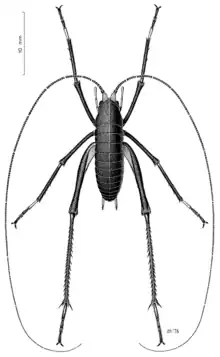| Pharmacus | |
|---|---|
 | |
| Pharmacus montanus | |
| Scientific classification | |
| Domain: | Eukaryota |
| Kingdom: | Animalia |
| Phylum: | Arthropoda |
| Class: | Insecta |
| Order: | Orthoptera |
| Suborder: | Ensifera |
| Family: | Rhaphidophoridae |
| Subfamily: | Macropathinae |
| Genus: | Pharmacus Pictet & Saussure, 1891 |
| Species | |
|
See text | |
Pharmacus is a genus of cave wētā in the family Rhaphidophoridae, endemic to New Zealand. All species are alpine adapted and found at high elevations in the South Island.[1] They live among rocks on high mountain ridges, often well above glaciers and vegetation.[2] Pharmacus has a geographical range that extends from Nelson south to central Otago and Fiordland.[2] They are small insects with a body length of approximately 14-20mm.[3] In this genus, females are larger than males.[3] All species exhibit dark brown to black pigmentation of the body and legs.[2] They have a dense clothing of setae and a serrated ovipositor.[3][2] When active they are lively jumpers.[3] For example, Pharmacus montanus is known as the Mount Cook flea because of its habit of leaping out of rock crevices on to mountain climbers.[4]
Taxonomy
The genus Pharmacus was first described by Pictet and de Saussure in 1893 as a monotypic taxon.[1] Pharmacus montanus was thought to be the only species in this genus.[1] However, three species were added to the genus by Richards in 1972.[1] These were Pharmacus brewsterensis (now moved to another genus), P. chapmanae and P. dumbletoni (both synonyms).[1] Six new species and three new subspecies have been recently added in 2022 by Hegg, Morgan-Richards and Trewick.[1] The six new species are Pharmacus concinnus, P. cristatus, P. notabilis, P. perfidus, P. senex, P. vallestris.[1] Three new subspecies of Pharmacus cochleatus have been described and are known as P. cochleatus rawhiti, P. cochleatus fiordensis, P. cochleatus nauclerus.[1]
Morphology
Pharmacus montanus: body length = 14mm, ovipositor = 9.9mm, foreleg = 18.7mm, mid leg = 18.7mm, hind leg = 28.6mm.[3]
Diet
Little is known about the diet of these alpine insects.[5] Pharmacus are mainly herbivorous[6] and have been observed feeding on rock lichen.[1] However, they probably prey on small invertebrates.[1] Pharmacus may also feed on the rich red algal growth that coats snow-fields during the summer season.[1]
Distribution
Pharmacus are alpine specialists and are found throughout the mountain ranges of New Zealand's South Island.[1] They are only found above the tree line and into the nival zone.[1] They have been sighted at 1300m above sea level or higher.[1] On Mt Cook P. montanus has been recorded at 3400 m asl.[6] Different species of Pharmacus have varied distributions throughout the South Island.[1] Pharmacus montanus and Pharmacus cochleatus are the two most widespread species, occupying the length of the Southern Alps from Fiordland to Kahurangi National Park.[1]
Species
- Pharmacus cochleatus (Karny, 1935)
- Pharmacus concinnus Hegg, Morgan-Richards &Trewick 2022
- Pharmacus cristatus Hegg, Morgan-Richards &Trewick 2022
- Pharmacus montanus Pictet & Saussure, 1891
- Pharmacus notabilis Hegg, Morgan-Richards &Trewick 2022
- Pharmacus perfidus Hegg, Morgan-Richards &Trewick 2022
- Pharmacus senex Hegg, Morgan-Richards &Trewick 2022
- Pharmacus vallestris Hegg, Morgan-Richards &Trewick 2022
References
- 1 2 3 4 5 6 7 8 9 10 11 12 13 14 15 16 Hegg, Danilo; Morgan-Richards, Mary; Trewick, Steven A. (2022). "High alpine sorcerers: revision of the cave wētā genus Pharmacus Pictet & de Saussure (Orthoptera: Rhaphidophoridae: Macropathinae), with the description of six new species and three new subspecies". European Journal of Taxonomy. 808: 1–58–1–58. doi:10.5852/ejt.2022.808.1721. ISSN 2118-9773.
- 1 2 3 4 Richards, Aola M. (1972). "Revision of the Rhaphidophoridae (Orthoptera) of New Zealand. Part XIV. Three alpine genera from the South Island". Journal of the Royal Society of New Zealand. 2 (2): 151–174. doi:10.1080/03036758.1972.10429371. ISSN 0303-6758.
- 1 2 3 4 5 "Pharmacus". wetageta.massey.ac.nz. Retrieved 2022-09-11.
- ↑ Dumbleton, L. J. (1935). "The alpine weta". New Zealand Alpine Journal. 6 (22): 172.
- ↑ Chinn, W. G. H.; Chinn, T. J. H. (2020). "Tracking the snow line: Responses to climate change by New Zealand alpine invertebrates". Arctic, Antarctic, and Alpine Research. 52 (1): 361–389. doi:10.1080/15230430.2020.1773033. ISSN 1523-0430.
- 1 2 Sweney, W. J. (1980). Insects of Mount Cook National Park (Thesis thesis). Lincoln College, University of Canterbury. hdl:10182/4038.